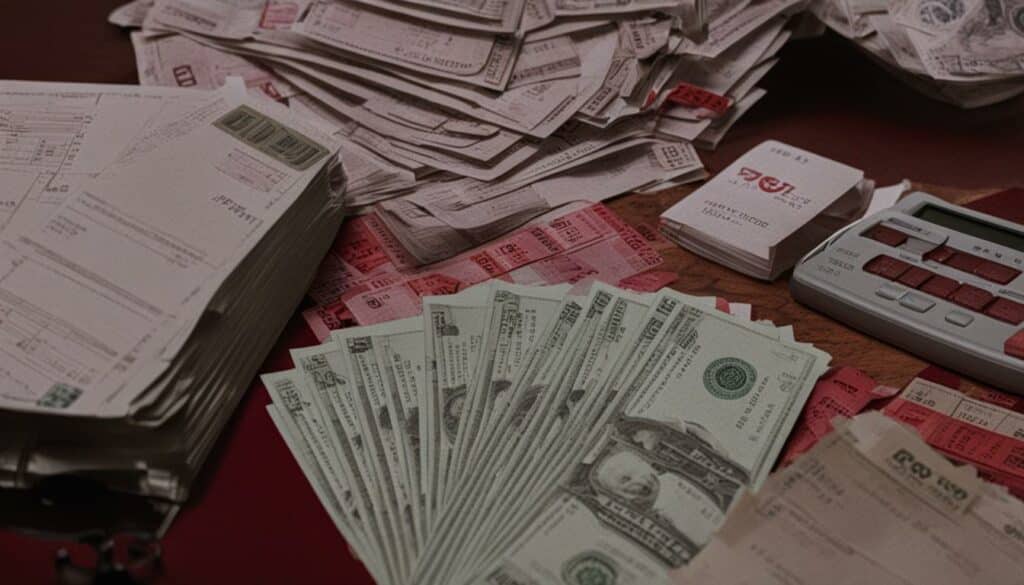Playing the lottery is a popular form of gambling that can potentially lead to significant winnings. However, it’s important to understand that losses are also a part of the game, and they can impact your tax returns.
Lottery gambling losses can be deducted from your taxable income, potentially reducing your overall tax liability. However, there are specific rules and regulations set forth by the IRS that you must adhere to.
In this section, we will delve into the intricacies of lottery gambling losses and how they impact your tax returns. We will explore the potential deductions available to you and discuss the rules and regulations set forth by the IRS.
Key Takeaways
- Lottery gambling losses can be deducted from your taxable income.
- There are specific rules and regulations set forth by the IRS that you must adhere to.
- Properly reporting and documenting your losses is essential for staying compliant with IRS regulations.
- Understanding how to maximize your deductions can help reduce your overall tax liability.
- Consulting with a tax professional can ensure compliance and fully understanding your specific situation.
Deducting Gambling Losses on Taxes
If you participate in any form of gambling, whether it be the lottery, slot machines, or sports betting, you may be eligible for tax deductions on your losses. These deductions can help offset the tax liability on your winnings, potentially reducing your overall tax bill.
Tax deductions for gambling losses are available if you itemize your deductions. To qualify, you must have accurate records of your losses, including the date, type of gambling, and amount lost. The amount of losses you can deduct is limited to the amount of your winnings.
The process of deducting gambling losses on taxes can be complex, but following a few basic steps can help ensure that you’re maximizing your potential deductions:
- Keep accurate records of your losses: As mentioned above, it’s crucial to have detailed records of all gambling losses to claim deductions.
- Itemize deductions on your tax return: To claim deductions for gambling losses, you must itemize your deductions on Schedule A of Form 1040.
- Report your losses properly: Use Form W-2G, Form 5754, or Form 1099-MISC to report gambling losses on your tax return. These forms provide documentation of your losses and are required by the IRS for reporting purposes.
- Understand the limitations: The amount of gambling losses you can deduct is limited to the amount of your winnings. So, if you don’t have any gambling winnings for the year, you can’t claim any losses.
It’s important to note that not all gambling losses are deductible. The IRS has specific rules and regulations regarding tax deductions for gambling losses, so it’s important to consult a tax professional for guidance on your specific situation.
Example:
| Type of Gambling | Date | Amount Lost |
|---|---|---|
| Lottery | January 1, 2021 | $500 |
| Slot Machines | April 15, 2021 | $1,000 |
| Sports Betting | October 31, 2021 | $1,500 |
In this example, the total amount of losses is $3,000. To claim deductions on these losses, the taxpayer must have accurate records and itemize deductions on their tax return. If the taxpayer had no gambling winnings for the year, they would not be eligible for any deductions.
Reporting Gambling Losses on Tax Return
Reporting your gambling losses on your tax return can be a daunting task, but it is essential for staying compliant with IRS regulations. The following steps can help ensure that you accurately report your losses and maximize your potential tax benefits.
Step 1: Use the Right Forms
When reporting gambling losses on your tax return, you’ll need to use Form 1040, Schedule A. This form allows you to itemize your deductions, including your gambling losses.
Step 2: Report All Winnings and Losses
It’s important to report all of your gambling winnings and losses, regardless of the amount. The IRS requires that you report all gambling winnings on your tax return, including those that are not subject to withholding. You can then offset your winnings with your losses to determine your net gambling income.
For example, if you win $1,000 in a lottery but also lose $500 at the casino, your net gambling income is $500 ($1,000 – $500).
Step 3: Keep Accurate Records
It’s crucial to keep accurate records of your gambling activity throughout the year. This includes documenting all of your winnings and losses, as well as any expenses related to your gambling activity.
You should keep all of your receipts, tickets, and other documentation related to your gambling activity. This will be useful if you are ever audited by the IRS.
Step 4: Be Aware of Limitations
The IRS has certain limitations on the amount of gambling losses that you can deduct. You can only deduct losses up to the amount of your winnings. For example, if you win $1,000 but lose $1,500, you can only deduct $1,000 in losses on your tax return.
Additionally, you cannot deduct gambling losses that exceed your total gambling income for the year. If you have net losses for the year, you cannot deduct them on your tax return.
Step 5: Consult with a Tax Professional
Reporting your gambling losses on your tax return can be complicated, especially if you have a lot of gambling activity throughout the year. It’s always best to consult with a tax professional who can help ensure that you are staying compliant with IRS regulations and maximizing your tax benefits.

“Proper reporting of gambling losses can help reduce your tax liability and maximize your tax benefits.”
Offsetting Lottery Losses Against Taxes
Did you know that in certain situations, you can use your lottery losses to reduce your taxable income? This can result in significant tax savings, but it’s important to understand the rules and limitations set forth by the IRS.
Claiming Lottery Losses on Tax Forms
If you want to offset your lottery losses against your taxable income, you will need to claim those losses on your tax forms. Specifically, you will need to use Schedule A (Form 1040) to itemize your deductions.
On Schedule A, you will report your gambling losses on Line 16. This line is specifically reserved for “other miscellaneous deductions,” which includes gambling losses. You will also need to report your winnings on Line 21, but only up to the amount of your reported losses.
It’s important to note that you can only claim gambling losses up to the amount of your reported winnings. So, if you had $5,000 in lottery winnings but $7,000 in losses, you can only claim a deduction of up to $5,000. Additionally, you must have documentation to support your reported losses, such as receipts, tickets, or other records.
Tax Benefits of Gambling Losses
Offsetting your lottery losses against your taxable income can have several benefits. First and foremost, it can reduce your overall tax liability, resulting in a lower tax bill. Additionally, it can potentially push you into a lower tax bracket, further increasing your tax savings.
It’s important to note that in order to maximize your tax benefits, you should aim to report as many gambling losses as possible. This means keeping accurate records of all your gambling activities throughout the year. Remember, even small losses can add up over time, so it’s important to document everything.
IRS Rules on Gambling Losses
The IRS has specific rules and regulations when it comes to reporting gambling losses. In addition to the limitations on claiming losses up to the amount of winnings, there are also restrictions on the types of losses that can be deducted.
For example, you cannot deduct losses from illegal gambling activities. Additionally, losses from other types of แทงหวย, such as horse racing or casino games, must be reported separately.
Reducing Taxable Income with Lottery Losses
By offsetting your lottery losses against your taxable income, you can potentially reduce your overall tax liability and keep more of your hard-earned money. However, it’s important to remember that there are limitations and restrictions when it comes to reporting gambling losses, and you must keep accurate documentation to support your claims.
If you’re unsure about how to properly report your gambling losses on your tax return, it’s always best to consult with a tax professional. They can guide you through the process and ensure that you’re complying with all IRS regulations.
“By properly reporting and documenting your losses, you can potentially reduce your tax liability and maximize your tax benefits.”
Conclusion
Understanding the intricacies of lottery gambling losses for tax purposes is crucial for maximizing your potential tax benefits. By properly reporting and documenting your losses, you can reduce your tax liability and potentially offset your lottery losses against your taxable income.
Consult with a Tax Professional
To ensure compliance with IRS regulations and to fully understand your specific situation, it is always recommended to consult with a tax professional. They can provide you with tailored advice and help you navigate the complex tax code.
Take Advantage of Available Deductions
Properly reporting and documenting your gambling losses can help you take advantage of all available deductions. By reducing your taxable income, you can potentially lower your tax liability and keep more money in your pocket.
Remember to always keep track of your losses and report them accurately on your tax return using the appropriate forms. With a little bit of knowledge and preparation, you can maximize your tax benefits and achieve greater financial success.
FAQ
Can I deduct lottery gambling losses on my tax return?
Yes, you can deduct lottery gambling losses on your tax return, but there are specific criteria and limitations set by the IRS.
What documentation do I need to support my gambling losses?
To support your gambling losses, you should keep a detailed record of your winnings and losses, including tickets, receipts, and other supporting documentation.
How do I report my gambling losses on my tax return?
You need to use Schedule A of Form 1040 to report your gambling losses. Make sure to accurately enter the total amount of losses you wish to claim.
Are there any limitations on the amount of gambling losses I can deduct?
Yes, the IRS limits the amount of gambling losses you can deduct to the extent of your gambling winnings. You cannot deduct more than what you have won.
Can I offset my lottery losses against my taxable income?
Yes, you can offset your lottery losses against your taxable income. However, there are specific rules and regulations set by the IRS that you must follow.
How can I maximize my tax deductions for gambling losses?
To maximize your tax deductions for gambling losses, make sure to keep accurate records, report your losses properly, and consult with a tax professional for guidance.














